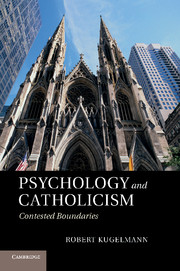Book contents
- Frontmatter
- Contents
- Acknowledgments
- 1 An introduction
- 2 The major fault line: modernism and psychology
- 3 Neoscholastic psychology
- 4 Psychology as the boundary: Catholicism, spiritualism, and science
- 5 Psychoanalysis versus the power of will
- 6 From out of the depths: Carl Jung's challenges and Catholic replies
- 7 Institutionalizing the relationship
- 8 Humanistic psychology and Catholicism: dialogue and confrontation
- 9 Trading zones between psychology and Catholicism
- 10 Crossings
- References
- Index
7 - Institutionalizing the relationship
Published online by Cambridge University Press: 05 July 2011
- Frontmatter
- Contents
- Acknowledgments
- 1 An introduction
- 2 The major fault line: modernism and psychology
- 3 Neoscholastic psychology
- 4 Psychology as the boundary: Catholicism, spiritualism, and science
- 5 Psychoanalysis versus the power of will
- 6 From out of the depths: Carl Jung's challenges and Catholic replies
- 7 Institutionalizing the relationship
- 8 Humanistic psychology and Catholicism: dialogue and confrontation
- 9 Trading zones between psychology and Catholicism
- 10 Crossings
- References
- Index
Summary
There would have been no contested boundaries between Catholicism and psychology if there had not had been places – physical locations and social institutions alike – where the lines could be drawn, divisions of labor proposed, social groups formed, and authorities created. In this chapter, we turn to some of these places. Primary institutions were psychology departments at Catholic colleges and universities, because they educated the cadre of psychologists who later created other institutions and staffed the – eventually – growing number of psychology departments, child guidance clinics, and other centers of applied psychology in the Catholic community. So we look briefly at the founding of psychology departments at Catholic universities in the early years of the twentieth century. Then, we turn to three organizations of Catholics in psychology: the Chicago Society of Catholic Psychologists, the American Catholic Psychological Association (ACPA), and the Guild of Catholic Psychiatrists (not psychologists, strictly speaking, but in the psychological field nonetheless). The focus will be primarily on the ACPA, as that was the group that made the biggest impact on the Catholic community during the years of its existence, 1948–70.
These institutional responses to psychology presupposed an attunement to the new discipline's usefulness in addressing difficulties, especially in education. In the early years of the twentieth century, there was not only a push from Catholic psychologists to incorporate the discipline into the community; there was a pull from others in the community to bring it in.
- Type
- Chapter
- Information
- Psychology and CatholicismContested Boundaries, pp. 261 - 305Publisher: Cambridge University PressPrint publication year: 2011



